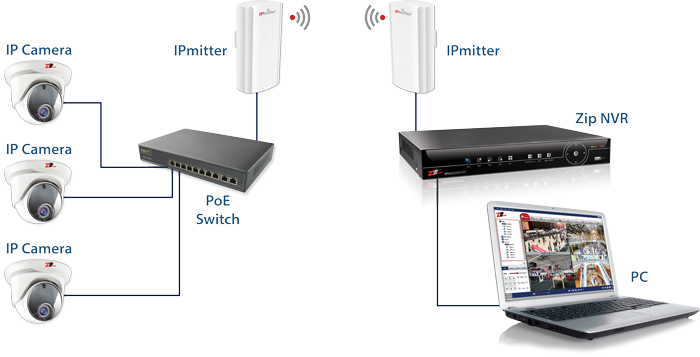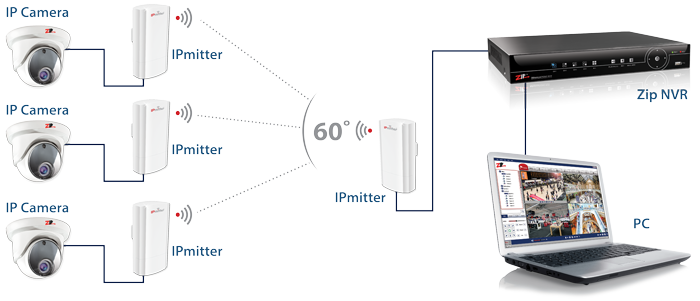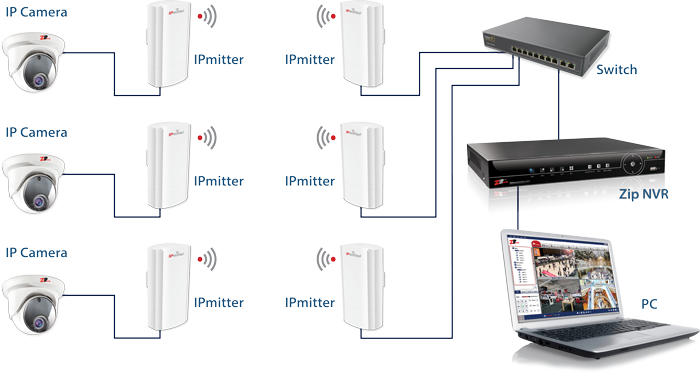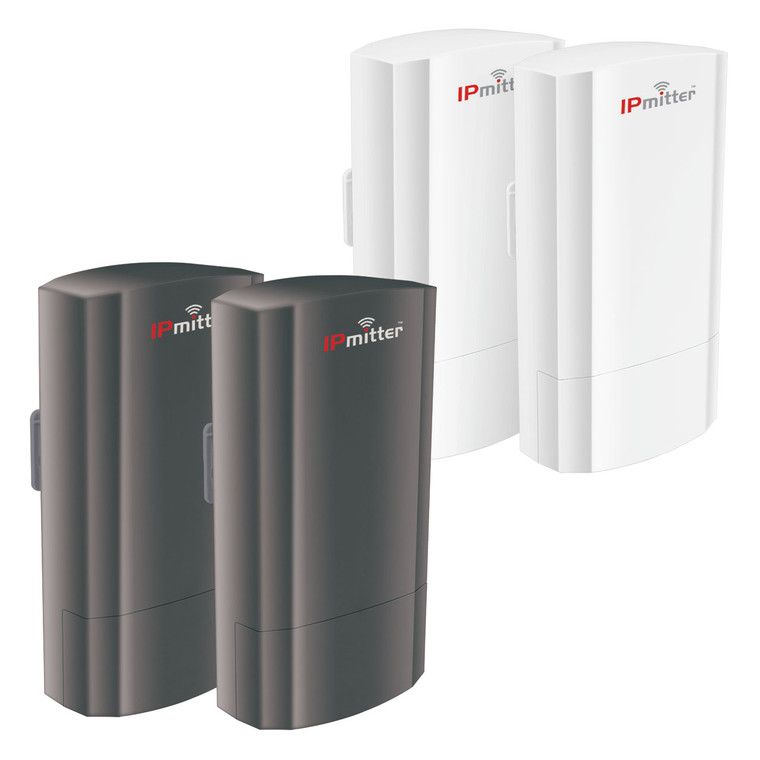Link Remote Buildings to Your Network Without Cables !
- 300mbps Up to 700m
- Wireless LAN Connectivity
- Easy Pair Setup
- Dual 12V & 48V PoE
Our budget IPmitters have a data transfer rate of 300Mbs, using the 2.4Ghz band, this is aimed at cost conscious installations.
These come ready paired.
If you want to link two locations together on a network where cabling is impossible or not economic then WiFi Bridges are a great choice. WiFi Bridges allow you to link IP from one building to another, or simply to link your garden office to your main house for internet or CCTV.
On many installations you will often find that the CCTV has to cover areas that are hard to cable, typically where the main CCTV system is in one building but other satellite buildings also need to be covered by CCTV.
So how do you connect IP CCTV systems in a separate building together?
One option is simply to cable them, but this could involve digging trenches or running overhead catenary wires. This can be both costly and disruptive which is where a wireless IP link is by far the most attractive solution.
The IPmitter wireless links are far more cost effective than running cables and much faster to deploy so they are more often than not the preferred choice for most installers where cabling is just too difficult. Clearly a proper "cabled" IP connection will always be faster in data transfer and also more reliable than a wireless one but where this is not practical or the cost is too high, a wireless "bridge" is a great solution.
As most fellow CCTV professionals want a simple and reliable solution to transmitting IP signals from building to building we have designed and launched the IPmitter.
The IPmitter range currently has 3 models for linking one building/location to another.
All 3 IPmitter models boast a superb easy pairing method which means you can set up the IPmitter without needing a laptop or PC to set up its IP address, perfect for getting the job done more efficiently and without needing a dedicated IP technician to do the install.
Our IPmitter bridges are available in the choice of Budget, Standard and Pro models and also in either black or white cases so they look great in any location. All three models are 48V PoE or you can power them with a standard 12V PSU if you prefer.
Budget - Has a data transfer rate of 300Mbs, using the 2.4Ghz band, this is aimed at cost conscious installations.
Standard - Has a faster data transfer rate of 450Mbps and uses the less crowded 5.8GHz band so is less likely to be fighting for airspace in areas that have a lot of WiFi equipment.
Pro - This is the top of the range IPmitter bridge and boasts an ultra fast 900Mbs data rate and also uses the 5.8GHz band for a less crowded airspace footprint. The 1Gig LAN port also makes this model more suitable for multiple IP camera transmission.
Each of the IPmitter bridges has a maximum and recommended transmission range. The maximum range is a distance we have tested the IPmitter at and it functions correctly. This is with direct line of sight with no obstacles and in good weather conditions. Because rain, snow and mist will all attenuate the signals between the IPmitters we include a "recommended" distance where we take into account "typical" UK weather. Clearly in severe weather conditions that may for example block out your SKY reception, the IPmitter would also suffer. If you have an obstacle in the way of the IPmitter the distance again will be reduced depending on how much signal the obstacle blocks.
Method 1 - Standard Outdoor WiFi Bridge or Link
In this mode the IPmitters are used to connect two separate IP devices or networks together for example linking one main building to another. The IPmitters would be installed outside the buildings and need to be visible to each other, this is called “direct line of sight”. Any obstacles that block the visible line of sight would attenuate and reduce the transmission range. It is possible to bypass buildings that block the signal by using multiple IPmitters to relay the signal and transmit around the obstacles.

Method 2 - "One to Many" WiFi Link
In this scenario one IPmitter is linking to three other IPmitters. The IPmitters have an internal antenna that transmits around a 50-60 degree spread so that is the maximum angle it would work at as in the diagram. If you need more flexibility than this you simply need to install multiple pairs of IPmitters that are all individually paired with each other (method 3).

Method 3 - Multiple Pairs
Although for the sake of simplicity the IPmitters in this diagram are shown together they would usually be in different locations around a building linking other buildings together for one local area network, LAN. As with all radio equipment you need to keep WiFi devices a sensible distance from each other and we would always recommend at least 1-2m apart from each other.

| IPMIT254B | IPMIT254W | |
|---|---|---|
| Units | Pair | Pair |
| Frequency | 2.4Ghz | 2.4Ghz |
| Wireless Data Speed | 300Mbps | 300Mbps |
| 12V Input Option | Yes (300mA) | Yes (300mA) |
| LAN Port 1 Speed | 10Mbs / 100Mbs | 10Mbs / 100Mbs |
| LAN Port 2 Speed | 10Mbs / 100Mbs | 10Mbs / 100Mbs |
| Max Tx Distance | 700m (Recommend 350m) | 700m (Recommend 350m) |
| Wireless Standard | IEEE802.11B/G/N | IEEE802.11B/G/N |
| Easy Pair Technology | Yes | Yes |
| Support 1 - 1 | Yes | Yes |
| Support 1 - Many | Yes | Yes |
| Modes | Access Point / Bridge / Repeater | Access Point / Bridge / Repeater |
| Power | 48V PoE / 12V DC | 48V PoE / 12V DC |
| Finish | Black | White |
| Mounting | Wall Or Pole (Not Supplied) | Wall Or Pole (Not Supplied) |
| Dimensions | (H) 165 x (W) 88 x (D) 56mm | (H) 165 x (W) 88 x (D) 56mm |
- Frequency:
- 2.4Ghz
- Wireless Data Speed:
- 300mbps
- Type:
- IP Bridge
- Transmission Distance:
- 700m






